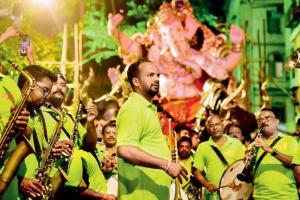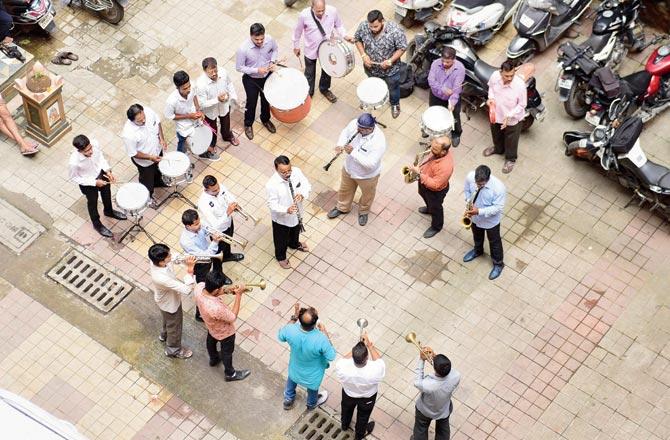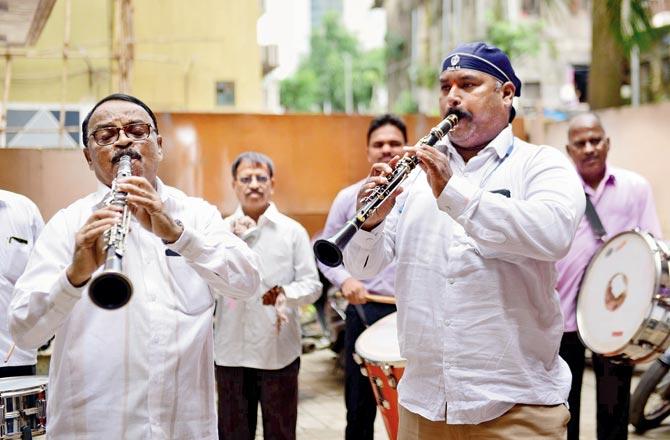Mumbai's oldest music band, now in its 50th year, preps for high-energy Ganesh festivities, longing to play at the feet of the illustrious Lalbaugcha Raja

Swaranjali Band members led by Mahesh Devlekar welcome Lord Ganesh in an aagaman ceremony in Khetwadi. Pics/Bipin Kokate
 Trumpet player Mahesh Devlekar, 35, doesn't keep a diary. None of the 30 members of the Swaranjali band, not even founder Sahadev Yashwant Gurav, 75, has chronicled the five momentous decades of being part of Mumbai's oldest surviving music band, known for an abiding presence in the 11-day-long Ganesh festivities. Devlekar, the current band lead, and his colleagues rely on collective memory to recall their magical trajectory—the annual act of playing together during the Gokulashtami-Ganpati-Navratri-Diwali festive season, the experience of lugging around metallic instruments and drums amid mammoth crowds and pouring monsoons, and the seaward visarjan journeys ending at wee hours.
Trumpet player Mahesh Devlekar, 35, doesn't keep a diary. None of the 30 members of the Swaranjali band, not even founder Sahadev Yashwant Gurav, 75, has chronicled the five momentous decades of being part of Mumbai's oldest surviving music band, known for an abiding presence in the 11-day-long Ganesh festivities. Devlekar, the current band lead, and his colleagues rely on collective memory to recall their magical trajectory—the annual act of playing together during the Gokulashtami-Ganpati-Navratri-Diwali festive season, the experience of lugging around metallic instruments and drums amid mammoth crowds and pouring monsoons, and the seaward visarjan journeys ending at wee hours.
ADVERTISEMENT
Interestingly, the only document the band relies on is an excel sheet of responsibilities, beginning with the elaborate jazzy aagaman (arrival) of Ganesh idols, which is nowadays almost a month before the festival. Most other correspondence with the Ganesh mandals, local police, and devotees is informal and verbal.
"There has never been any down time for jotting down or looking back. We live from year-to-year, happy to be aligned with the Lord's arrival and departure," recounts Devlekar who is known for introducing new celebratory themes each year. He is presently garnering support from loosely bound members of other bands, so as to commemorate the 86th year of the Lalbaug Ganesh Mandal. Last year, he had made a collective of 85 players who created a sensation in the immersion ceremony. He intends to up the ante each year. In fact, he believes that band members should cut loose their divides in front of the Lord, considering that few bands exist in the city. Last year, in a bid to bring rival band players face-to-face, he devised a four-minute drum call accompanied by a unique fire play, which coincided with the welcome of Chinchpoklicha Chintamani. Sack cloths were stealthily placed on hand drums over which a special gel sparked the ceremonial aartis; each drummer carried a fire extinguisher as part of the emergency plan. The band aarti was a new record, which Devlekar is going to avoid this year, considering the two million devotees expected to converge at Chintamani's feet. The idol hits a century this year.

Bappa's band devotees rehearse their act for the upcoming celebratory season
A coffee table book commemorating the centenary is on the way, aptly complemented by a special song (written by Devlekar and music teacher Harshad Mestry) to be played by Swaranjali at the upcoming festival—Shataka Raja, Chintamani Maaza/Aaturta Tula Pahnyachi/Mani Odh Tuzhya Aagamanachi. (Yay Lord of the Century, I am eagerly awaiting your arrival).
The lyrics sum up Swaranjali's sentiments for the season. This is the time of the year when band members forego food, sleep, leisure, and any other comfort for the sake of being in close proximity with the Lord. In 2002, when Devlekar joined the Indian Navy as a petty officer (musician), he played the trumpet for Lalbaugcha Raja's immersion at 12 pm at Girgaum Chowpaty the earlier night, and then proceeded for his induction in the morning. Even when aboard (near Vishakhapatnam) the Rajput-class destroyer INS Rana for the first four years of his service, he availed of leave only once a year, during Ganpati celebrations. When he married in 2005, the honeymoon was shorter than the Ganpati vacation. After he retired from the Navy in 2017, and took to freelance music tuitions, Lalbaug became a focal point of his life because he is in charge of the logistics of pledging time and attention of players of varying age groups (20 to 75), living in different suburbs of Mumbai and following diverse professional callings. He also keeps a strict eye on the songs which the band chooses to play. While popular demands (Sairat) have to be entertained, Devlekar refuses to play unrelated numbers. Devotional songs of any language are welcome.
"Ours is not an on-demand paid orchestra but a troop of Bappa devotees who voluntarily play a range of instruments—drums, trumpets, saxophones, clarinets and sometimes bagpipers—to practice a vanishing art. We don't want it to die." Like Devlekar, most band members have encouraged their children to learn one instrument at least, much like they were at one point groomed by Gurav guruji at Kalachowkie's Shivaji Vidyalaya. When he was recently publicly felicitated for 50 years of nurturing Girangaon (mill land area) band talent, guruji added with a chuckle: "Most families of mill owners willingly spared their kids' time for Bappa's band. It was seen as seva." He calls it the season for giving—the time when people open their purses (hearts) and strangers feed meals to passersby.

Band member Niranjan Patil seen playing the clarinet
For members of the Swaranjali band, Ganpati festivities take precedence over other priorities. When Dombivali-based trumpet player Sameer Khair, 40, joined a construction company (in Andheri) selling second homes in Konkan, he started on the condition of working half days for the entire stretch of the festival. At one point, he was working in the distant suburb of Khalapur (Raigad), which was no deterrent for the daily commute to Lalbaug for rehearsals. Similarly, Prashant Chorghe (33) who works in Goregaon in a 3D conversion film unit, has already told his boss to adjust shift duties to accommodate off-time for the 11th day of visarjan. Three years ago, he recalls, the Anant Chaturdashi day coincided with sudden deadlines. "Despite clocking in three shifts of 24 hours, I ran like a hysterical man towards Byculla where Lalbaug's Lord had reached around 8 pm... After I caught up with fellows, put all my energy into my trumpet, and stood amid a 75,000-plus crowd, I felt normal."
Each band member has a Ganpati story in which distance, time, speed and deadlines attain a mystic dimension. Even for mundane chores—timely delivery of T-shirts, adjustments in night rehearsal timings, vada pav breaks amid the visarjan procession, and distribution of maandhan (remuneration) for outstation performances—Swaranjali adds a festive importance to each assignment. As saxophonist Kishore Yendre, 58, also employed in Central Railway's musical band, says: "We take these small tasks very seriously because one small mistake can spoil the mass-entertainment that we gear ourselves for. In fact, the band takes supreme dietary precautions during the Ganeshotsav, to avoid medical issues."
Closer to any performance, particularly the visarjan, the metallic instrument players cannot drink refrigerated water, neither can they stuff their stomachs with fried munchies or any other snack. The irony of the situation is that vada pav is the most easily available and unavoidable eatable on Mumbai streets. Interestingly, after the Ganpati festival gets over, band members need at least a week to pull their bodies back in action. Brass players, often with swollen lips, first take to liquids before resuming proper meals; drummers rest their backs, which usually bend after carrying the instrument over a stretch. They take foot injuries in their stride, as dancing-drumming barefoot on wet roads doesn't happen every day.
Ganpati festival is an overhauling moment for Mumbai when women dance with gay abandon, families sleep on dividers to catch Bappa's glimpse, traffic diversions become the norm, children stop worrying about unit tests, first class railway compartments become open for Bappa carriers, political rivals pray together for modak offerings, and band music permeates public spaces, thanks to Swaranjali which carries a tradition on its firm shoulders.
Sumedha Raikar Mhatre is a culture columnist in search of the sub-text. You can reach her at sumedha.raikar@gmail.com
Catch up on all the latest Crime, National, International and Hatke news here. Also download the new mid-day Android and iOS apps to get latest updates
 Subscribe today by clicking the link and stay updated with the latest news!" Click here!
Subscribe today by clicking the link and stay updated with the latest news!" Click here!






